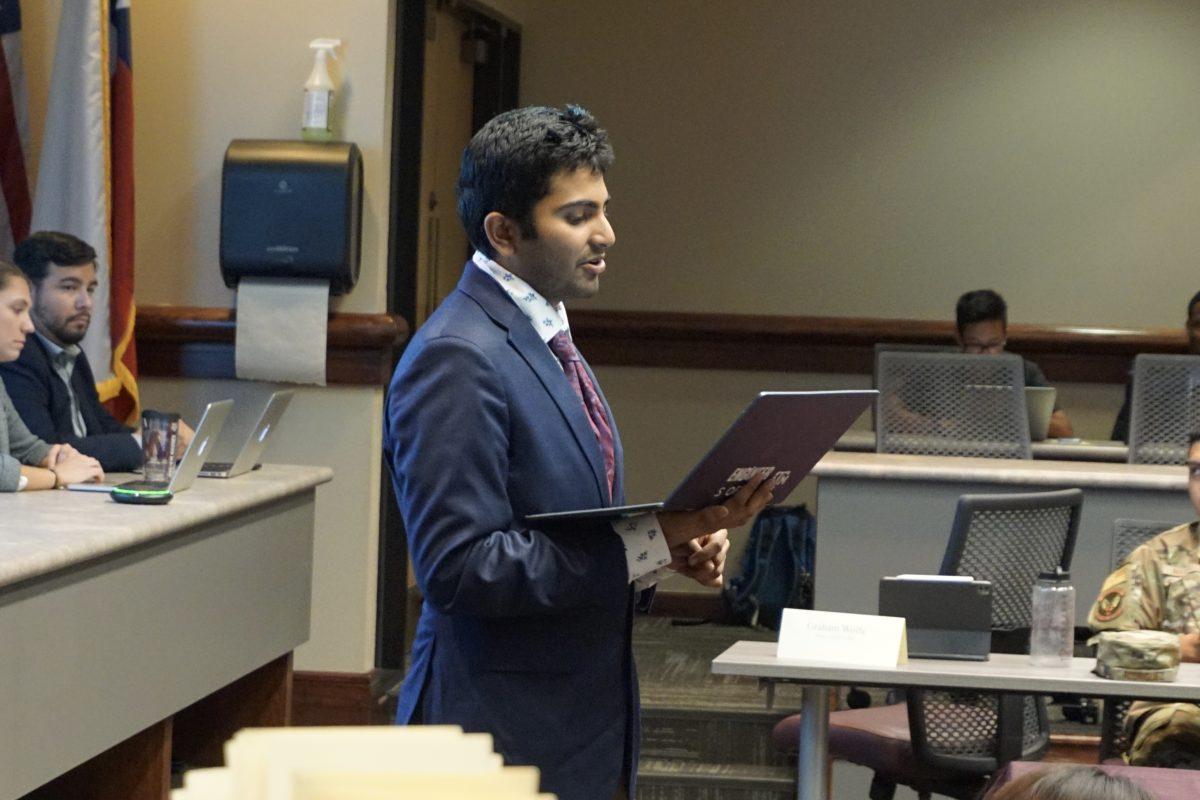The Texas A&M Student Senate wrapped up the year by passing new legislation to encourage a widespread system to identify struggling students. The Student Senate also continues to pursue its Lyft partnership and lobby the Texas state government for the standardization of college core curriculum requirements and for the decriminalization of marijuana.
The 75th Session of Student Senate began the meeting by commending their current longest-serving senator, computer science senior and Engineering Senator Sam Jefferis. Jefferis served on the senate for four and a half years and will be graduating in December. Jefferis gave his last words on behalf of “the elderly” of the senate.
However, despite it being Jefferis’ last official meeting, he finished his service through one final productive evening.
Entering the period of new business, Jefferis and Off-Campus Senator Andrew Applewhite presented the Student Well-being Assessment and Mitigation Improvement Resolution. The piece calls for the expansion of the current early alert system that identifies struggling students and the creation of further initiatives to reach them.
Jefferis and Applewhite presented their concerns to the senate, recognizing the tragic suicide of Ivan Zabrodin, who was recognized earlier this year at the September Silver Taps ceremony. The legislation quoted an article from The Battalion, in which Zabrodin’s mother shared her frustrations about the lack of a system that could have identified that he was struggling.
The resolution proposes the expansion of additional resources to help aid students before, during and after periods of academic and emotional distress. Currently, there is no widespread system that identifies struggling students. There only exists an early alert system in six classes at Texas A&M.
The early alert system has three tiers for attempting to contact the student. In the first attempt, an academic peer mentor would visit on-campus students, while off-campus students would receive an email. Three weeks after the first attempt, the professor of the course will message the student. Three weeks after the second attempt, an academic advisor will reach out. Additionally, only freshmen taking the partnered EDGE grant-sponsored classes are able to participate in the early alert system.
“[Zabrodin]’s mother expressed frustration with some issues in the system where we don’t have any red flags that pop up for students that don’t show up to class for a few weeks or a few months, if they’re not turning anything in or severely struggling,” Applewhite said.
Jefferis and Applewhite called for further support and expansion of the system, despite its flaws. They stated their interest in expanding the contact attempts from academic peer mentors beyond just the first alert. They also called for the system to become widespread and instated in all freshmen classes.
Additionally, the resolution states their support for automatic re-admission for students who withdraw due to medical or mental health reasons. The resolution asks for automatic readmission for all students who unenrolled from the university in good standing. They addressed the concerns of students that have to leave due to these reasons and are unable to resume their studies.
“I just want to reiterate that this is something that everyone can benefit from,” Applewhite said. “Mental health is something that [we], as student government, really need to support because it’s just as important as physical health. There are people getting lost between the cracks that we’re not able to provide enough support for right now.”
Jefferis motioned to send the legislation to the academic affairs committee, which was passed by a voice vote.
During the period of unfinished business, the Student Senate and Lyft Subcommittee Establishment Bill was read for the second time. Originally read at the last Nov. 2 meeting, the bill would establish a subcommittee to pursue the possibility of a Lyft partnership to reduce the cost of local rideshares.
As Off-Campus Senator Fawaz Syed began his period of presentation, Jefferis motioned to enter an executive session. The executive session was a private section of the senate meeting to discuss sensitive information regarding the bill. Syed, the author of the bill, and Jefferis, the original sponsor, have been pursuing the plausibility of a partnership with Lyft for months.
The Battalion was asked to step out of the meeting, as the senate entered an executive session, however, the Student Senate x Lyft Subcommittee Establishment Bill was voted on and passed, but the vote count is currently withheld.
Legislative Relations Chair Pat Englehart read the Core Curriculum Advocacy Bill and immediately motioned to consider the piece as emergency legislation. According to the bill, it would authorize lobbying the Texas state government to “standardize [university core curriculum] requirements in an effort to save students money and time.”
During the period of debate, Speaker Pro Tempore Brandon Rea debated against Englehart’s motion for emergency consideration, stating that the Texas Higher Education Coordinating Board, or THECB, meets year-round.
“The [THECB] does not have the authority to implement what this bill calls for. It has to be done in a bill by the Texas legislature,” Englehart said.
The senate agreed with Englehart’s motion, and the bill was considered an emergency.
As Englehart said, the bill would lobby for standardization of the Texas core curriculum. All undergraduates are required to complete 42 hours of core classes for their degree, and issues arise if an institution does not accept or recognize class credits from another institution.
After the Core Curriculum Advocacy Bill was read in its entirety, it was passed by a vote of 34-0.
Additionally, Englehart presented the first reading Marijuana Decriminalization Bill, but he also motioned for the senate to consider the piece as emergency legislation. The bill would authorize the legislative relations commission to lobby the state government to decriminalize the possession of marijuana.
The senate voted 25-9 to postpone the Marijuana Decriminalization Bill indefinitely, removing any chance for its approval until March 2023.










